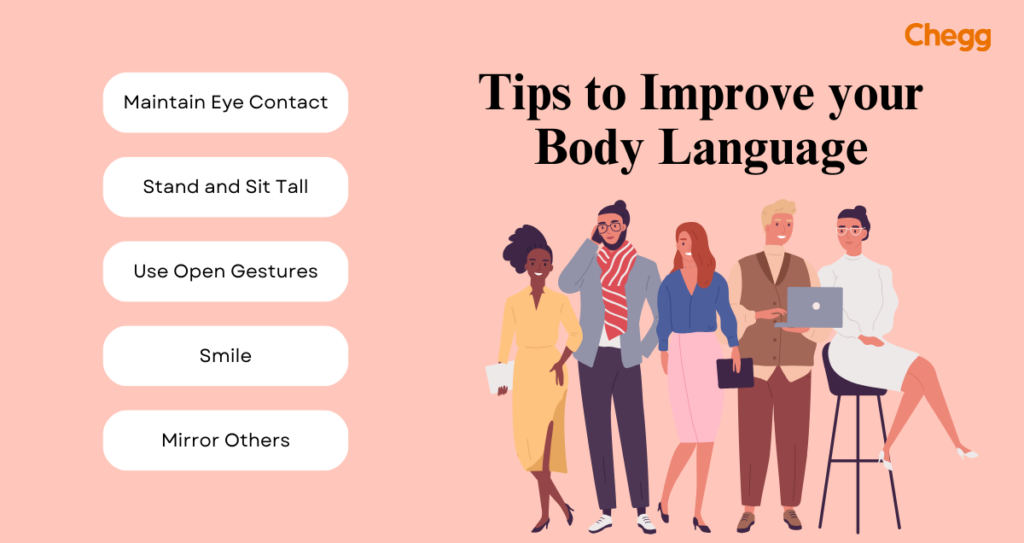Importance of Body Language in Corporate
Body language is a powerful tool that we all use, even if we don’t realize it. It includes the way we sit, stand, make eye contact, and use our hands. In the workplace, body language plays an important role in communication. The importance of body language in the workplace cannot be ignored because it helps […] The post Importance of Body Language in Corporate appeared first on Chegg India.

Body language is a powerful tool that we all use, even if we don’t realize it. It includes the way we sit, stand, make eye contact, and use our hands. In the workplace, body language plays an important role in communication. The importance of body language in the workplace cannot be ignored because it helps convey feelings, build trust, and create better relationships with others. According to a 2021 survey, 67% of employees reported that they trust leaders with confident body language more than those with weak or defensive postures.
In this blog, we will discover the importance of body language in the workplace and how to improve it!
What is Body Language?
Body language is a form of non-verbal communication. It includes facial expressions, gestures, posture, and eye contact. Sometimes, we say a lot without even speaking. For example, crossing our arms might show that we are upset or defensive. Smiling shows that we are happy or friendly. This kind of communication happens every day at work, and it can make a big difference in how we are seen by others.
Why Body Language is Important at Work
The importance of body language in the workplace is huge. It affects how others see us and how we see others. Here are some reasons why body language is important:
1. First Impressions
When you meet someone at work for the first time, they notice your body language before you even speak. A firm handshake, good posture, and a friendly smile show confidence. Making eye contact and standing tall can make you seem more trustworthy. On the other hand, slouching, avoiding eye contact, or fidgeting can give a bad first impression.
2. Building Relationships
Body language is important when building relationships with coworkers, managers, or clients. Good body language shows that you are listening and engaged in the conversation. Nodding your head, leaning slightly forward, and making eye contact shows that you care about what the other person is saying. The importance of body language in the workplace is clear when it helps create strong connections with others.
3. Confidence and Leadership
Leaders in the workplace often have strong, positive body language. Body language is crucial in leadership as it shows confidence and authority. A leader who stands tall, uses open gestures, and makes eye contact is seen as more capable. Employees tend to trust and follow leaders who have good body language.
4. Solving Problems
When conflicts or problems arise at work, body language can help or hurt the situation. The importance of body language in the workplace becomes clear when trying to resolve issues. Calm body language, like sitting still and keeping a neutral facial expression, can help keep conversations peaceful. On the other hand, crossing arms, frowning, or tapping fingers can make others feel defensive or angry.
How to Improve Body Language

Improving body language at work is not difficult. Here are some tips to help:
1. Maintain Eye Contact
One of the easiest ways to show confidence and interest is to maintain eye contact during conversations. Looking at the person speaking helps you build trust and shows that you are listening. However, don’t stare too much, as that can make people uncomfortable.
2. Stand and Sit Tall
Good posture shows that you are confident and ready to work. Whether you are standing or sitting, keeping your back straight and shoulders relaxed makes you look professional. Slouching or leaning back too much can make you look lazy or uninterested.
3. Use Open Gestures
Using open gestures, like keeping your hands visible and not crossing your arms, shows that you are approachable. Open body language invites others to communicate with you. The importance of body language in making others feel comfortable cannot be overstated.
4. Smile
A simple smile can go a long way in the workplace. Smiling shows that you are friendly and happy to be at work. It also makes others feel more comfortable around you. The importance of body language, especially smiling, is key to creating a positive work environment.
5. Mirror Others
Mirroring, or copying, the body language of the person you are speaking with can help build rapport. If they are smiling, you smile. If they are leaning forward, you do the same. This shows that you are in tune with the conversation and helps make the other person feel understood.
Wrapping Up
The importance of body language in the workplace is clear. It helps us make better first impressions, build strong relationships, and show confidence. By improving our body language, we can communicate better with our coworkers and create a more positive work environment. Whether it’s making eye contact, standing tall, or using open gestures, small changes in body language can lead to big improvements at work. Understanding the importance of body language can help us succeed in our professional lives.
Also Read:
Understanding Elevator Pitch Meaning: Definition and Examples
The post Importance of Body Language in Corporate appeared first on Chegg India.


















/cdn.vox-cdn.com/uploads/chorus_asset/file/25115065/DCD_Avishai_Abrahami.jpg)







